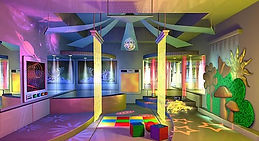Behavior Counseling. Coaching. Consultation and Individualized Therapy
Sensory Room Development and Training




Now more than ever, we are seeing an increase in autism and sensory processing disorder diagnoses, so the need for sensory inclusive environments is GREAT!
By incorporating sensory rooms into these settings, we can create more inclusive, supportive, and accommodating environments for individuals with special needs and their families.
Dynamic Instruction will take out the “guessing game” for you and develop a sensory room/area in your establishment that will meet your needs and create a inclusive environment for your patrons, clients, students. Staff training is also available for churches and schools where staff/volunteers interact with children of all ages and diagnoses.
General Benefits of Sensory Rooms:
-
Calming Effect: They help individuals regulate their sensory input, leading to a calming effect and reducing anxiety.
-
Improved Focus: Sensory rooms can enhance focus and attention, particularly beneficial in educational settings.
-
Therapeutic Tools: Equipped with various sensory tools and activities, these rooms can be used for therapy and skill development.
-
Inclusion and Accessibility: Sensory rooms promote inclusion by making various environments accessible to individuals with sensory processing challenges.
By incorporating sensory rooms into these settings, we can create more inclusive, supportive, and accommodating environments for individuals with special needs and their families.
Sensory Rooms for Churches
-
Inclusive Worship Experience: Sensory rooms allow individuals with sensory sensitivities to participate in religious services and activities in a comfortable environment.
-
Stress Relief: They provide a space for individuals to retreat if they feel overwhelmed by the noise and activity typical in church settings.
-
Community Engagement: Sensory rooms help create an inclusive community, ensuring that families with special needs can fully participate in church life.
Sensory Rooms for Schools
-
Enhanced Learning: Sensory rooms help students with special needs regulate their emotions and sensory input, improving their ability to focus and learn.
-
Behavioral Support: They provide a safe space for students to manage sensory overload, reducing the likelihood of behavioral outbursts.
-
Therapeutic Benefits: Sensory rooms can be used for therapy sessions, helping students develop coping strategies and sensory processing skills.
Sensory Rooms for Airports
-
Travel Accessibility: Sensory rooms make air travel more accessible for individuals with sensory processing disorders by providing a calm space away from the busy and often overwhelming airport environment.
-
Stress Reduction: They help travelers manage the stress and anxiety associated with crowded and noisy airport terminals.
-
Improved Experience: Sensory rooms contribute to a more positive travel experience for individuals with sensory sensitivities and their families.
Sensory Rooms for Restaurants
-
Dining Comfort: Sensory rooms in restaurants offer a quiet and comfortable space for individuals who may find the typical restaurant environment too stimulating.
-
Family Inclusion: Families with special needs members can enjoy dining out together, knowing there is a place to retreat if sensory overload occurs.
-
Customer Satisfaction: Providing sensory rooms can enhance the overall dining experience, making restaurants more inclusive and accommodating.